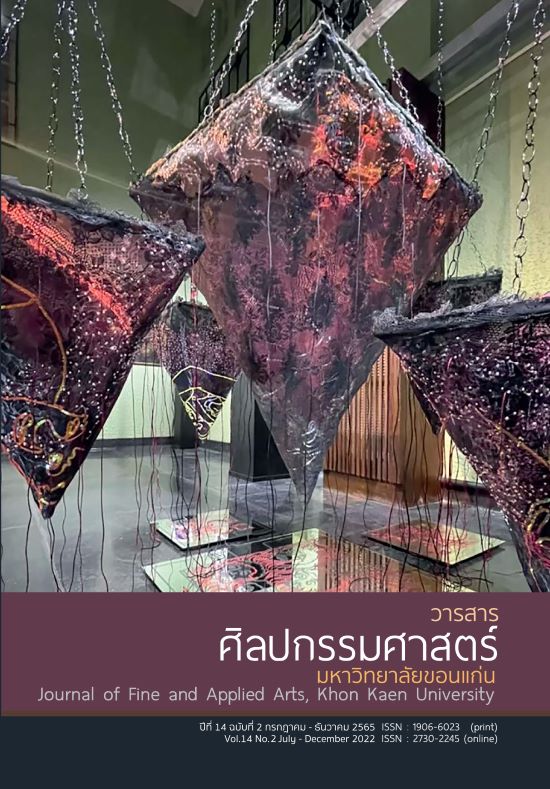A Teacher Identity and Role Model Characteristics of Kru Chawengsak Phothisombat
Main Article Content
Abstract
This qualitative research study aims to examine a teacher identity and role model characteristics of Kru Chawengsak Phothisombat. The methodology process began with specifying sources and key informants which includes 1) documents and related research and 2) key informants that were drawn using purposive sampling and snowball sampling. The research tools of this study were document and electronic media form, Semi-structural interview questions, and observation form. The data collected by participant observation, and Informal interview. In the data analysis process, content analysis was employed, and triangulation was used for data validation.
The findings have shown that the teacher identity and role model characteristics of Kru Chawengsak Phothisombat was divided into 4 parts: 1) To be proficient in Thai music
in both theoretical and performance advance skills and being widely well-known by Thai musicians, 2) Having teaching abilities, to begin with analyzing student background ability, having good pedagogy, and using the authentic assessment, 3) Full of mercy to all students, not only giving full of knowledge transparently, but also always take good care of the students as members of the family, and 4) Being a positive role model for students, in terms of good personality, ability and skillfulness, adaptability, and gratitude.
Article Details

This work is licensed under a Creative Commons Attribution-NonCommercial-NoDerivatives 4.0 International License.
Content and information in articles published in the Journal of Fine and Applied Arts of Khon Kaen University is regarded as the opinion and sole responsibility of the author(s) directly; therefore, editors are not obliged to agree to or share any responsibility with regard to the content and information that appears within these articles.
All articles, information, content, image, etc. that have been published in the Journal of Fine and Applied Arts of Khon Kaen University is the copyright of the Journal of Fine and Appllied Arts of Khon Kaen University. Any person or organization who wishes to distribute all or parts of the articles for further dissemination or other usage must first receive permission from the Journal of Fine and Applied Arts of Khon Kaen University before proceeding to do so.
References
กรมศิลปากร. (2545). คำบรรยายวิชา ดุริยางคศาสตร์ไทย. กรุงเทพฯ : ชวนพิมพ์.
เจษฎาวัลย์ ปลงใจ. (2561). จริยธรรมกับความเป็นครู. วารสารบัณฑิตศึกษาปริทรรศน์ มจร วิทยาเขตแพร่, 4(1), 113-123.
ทิศนา แขมมณี. (2561). ศาสตร์การสอน องค์ความรู้เพื่อการจัดกระบวนการเรียนรู้ที่มีประสิทธิภาพ. กรุงเทพฯ : โรงพิมพ์แห่งจุฬาลงกรณ์มหาวิทยาลัย.
นิทรา ฉิ่นไพศาล, และพระครูสุจิตรัตนากร. (2559). คุณธรรมความเป็นครู. วารสารครุศาสตร์ปริทรรศน์ฯ, 3(1), 142-155.
พรปวีณ์ จันทร์ผ่อง, และดนีญา อุทัยสุข. (2562). กรอบมโนทัศน์ เรื่อง การใช้หลักความเมตตาในการสอนดนตรีไทยของผู้ช่วยศาสตราจารย์สงบศึก ธรรมวิหาร. วารสารอิเล็กทรอนิกส์ Veridian มหาวิทยาลัยศิลปากร (มนุษยศาสตร์สังคมศาสตร์และศิลปะ), 12(6), 1487-1506.
ยุทธนา ฉัพพรรณรัตน์. (2561). ดนตรีไทยศึกษา. กรุงเทพฯ : โรงพิมพ์แห่งจุฬาลงกรณ์มหาวิทยาลัย.
ราชบัณฑิตยสถาน. (2554). พจนานุกรมฉบับราชบัณฑิตยสถาน พ.ศ. 2554. ค้นเมื่อ 18 พฤษภาคม 2564, จาก https://dictionary.orst.go.th/
วราภรณ์ เชิดชู. (2548). การศึกษาเพลงทยอยเดี่ยวสำหรับซออู้ทางครูหลวงไพเราะเสียงซอ (อุ่น ดูรยะชีวิน). วิทยานิพนธ์ปริญญาศิลปศาสตรมหาบัณฑิต สาขาดุริยางค์ไทย บัณฑิตวิทยาลัย จุฬาลงกรณ์มหาวิทยาลัย.
วัลนิกา ฉลากบาง. (2559). จิตวิญญาณความเป็นครู: คุณลักษณะสำาคัญของครูมืออาชีพ. วารสารมหาวิทยาลัยนครพนม, 6(2), 123-128.
วิชฎาลัมพก์ เหล่าวานิช. (2556). กระบวนการกลายเป็นชายขอบของวิชาดนตรีในหลักสูตรการศึกษาขั้นพื้นฐาน: วิธีศึกษาแนวโบราณคดีความรู้. วิทยานิพนธ์ปริญญาปรัชญาดุษฎีบัณฑิต สาขาดนตรี บัณฑิตวิทยาลัย มหาวิทยาลัยมหิดล.
สิดารัศมิ์ สิงหเดชาสิทธิ์, และสุชาดา บวรกิติวงศ์. (2560). การพัฒนาตัวบ่งชี้ความเป็นครูมืออาชีพ. วารสารอิเล็กทรอนิกส์ทางการศึกษา, 12(4), 695-707.
สุเทพ อัตถากร. (2536). ความเป็นครูในสังคมปัจจุบัน. วารสารปาริชาต มหาวิทยาลัยทักษิณ, 6(2), 1-2.
สุภางค์ จันทวานิช. (2561). วิธีการวิจัยเชิงคุณภาพ. กรุงเทพฯ : โรงพิมพ์แห่งจุฬาลงกรณ์มหาวิทยาลัย.
เสาวภาคย์ อุดมวิชัยวัฒน์. (2561). การพัฒนาคุณลักษณะครูดนตรีไทยที่พึงประสงค์ในระดับอุดมศึกษา: กรณีศึกษา ครูสำราญ เกิดผล ศิลปินแห่งชาติ. วารสารครุศาสตร์ จุฬาลงกรณ์มหาวิทยาลัย, 46(4), 439-460.
อำไพ สุริตกุล. (2534). คุณธรรมครูไทย: เอกสารทางวิชาการ. กรุงเทพฯ : คณะครุศาสตร์ จุฬาลงกรณ์มหาวิทยาลัย.
อุทัย ศาสตรา. (2553). การศึกษากระบวนการถ่ายทอดการบรรเลงระนาดเอกของครูประสิทธิ์ ถาวรศิลปินแห่งชาติ. วิทยานิพนธ์ปริญญาครุศาสตรมหาบัณฑิต สาขาดนตรีศึกษา คณะครุศาสตร์ จุฬาลงกรณ์มหาวิทยาลัย.
Abramo, M. N. (2009). The construction of instrumental music teacher identity. Doctor of Education Dissertation, Teachers College, Columbia University.
Anderso, L. W., Krathwohl, D. R., Airasian, P., Cruikshank, K., Mayer, R., Pintrich, P., et al. (2001). A taxonomy for learning, teaching and assessing: A revision of Bloom’s taxonomy of educational objectives. New York : Addison Wesley Longman.
Babbie, E. (2001). The practice of social research. Boston, MA : Wadsworth.
Biasutti, M., & Concina, E. (2018). The effective music teacher: The influence of personal, social, and cognitive dimensions on music teacher self-efficacy. Musicae Scientiae, 22(2), 264-279.
Creswell, J. (2007). Quality and inquiry research design: Choosing among five approaches. Thousand Oaks, CA : Sage.
Creswell, J. W. (2014). Research design: Qualitative, quantitative, and mixed methods approaches. 4th ed. Thousand Oaks, CA : Sage.
Dolloff, L. A. (1999). Imagining Ourselves as Teachers: the development of teacher identity in music teacher education. Music Education Research, 1(2), 191-208.
Pellegrino, K. (2009). Connections between performer and teacher identities in music teachers: Setting an agenda for research. Journal of Music Teacher Education, 19(1), 39-55.
Schatzman, L., & Strauss, A. L. (1973). Field research: Strategies for a natural sociology. Englewood Cliffs, NJ: Preentice-Hall.
Steiner, E. (1988). Methodology of theory building. Sydney : Educology Research Associates.
Wagoner, C. L. (2011). Defining and measuring music teacher identity: A study of self-efficacy and commitment among music teachers. Doctor of Philosophy Dissertation, Faculty of the Graduate School, The University of North Carolina, Greensboro.


